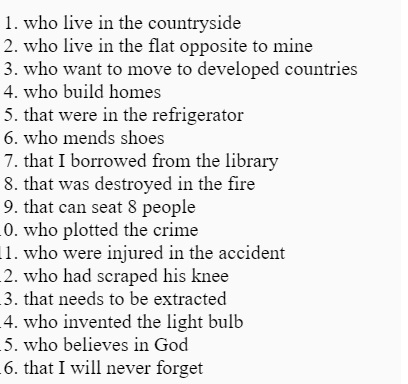Adjective Clauses
Adjective clauses function as adjectives. They describe nouns and pronouns. Most adjective clauses start with the pronouns who, whom, which, that, whose, when, or where. Other pronouns like whoever, whatever, whomever, whichever, what and why can also start an adjective clause. Adjective clauses that begin with one of the relative pronouns are also called relative clauses.
Examples are:
- We set out for the next town where we had planned to stay the night. (The adjective clause ‘where we had planned to stay the night’ describes the noun ‘town’.)
- The boy who stole the watch was caught. (The adjective clause ‘who stole the watch’ describes the noun ‘boy’.)
- This is a fine opportunity which should not be lost. (The adjective clause ‘which should not be lost’ describes the noun ‘opportunity’.)
- I found a quiet place where we can meet. (The adjective clause ‘where we can meet’ describes the noun ‘place.’)
- Here is the book that you were looking for. (The adjective clause ‘that you were looking for’ describes the noun ‘book’.)
- Have you ever spoken to the people who live next door? (The adjective clause ‘who live next door’ describes the noun ‘people’.)
Worksheet
Underline the adjective clauses in the following sentences.
- People who live in the countryside tend to be healthier than those who live in cities.
- The young men who live in the flat opposite to mine keep having all night parties.
- I know a lot of young people who want to move to developed countries.
- Masons are people who build homes.
- Where are the apples that were in the refrigerator?
- A cobbler is someone who mends shoes.
- I haven’t finished reading the book that I borrowed from the library.
- The house that was destroyed in the fire belonged to my uncle.
- They have bought a new car that can seat 8 people.
- The police have arrested the man who plotted the crime.
- People who were injured in the accident are in hospital.
- The boy who had scraped his knee cried in pain.
- I have an impacted tooth that needs to be extracted.
- Thomas Alva Edison was the man who invented the light bulb.
- A theist is a person who believes in God.
- She said something that I will never forget.
Answers
